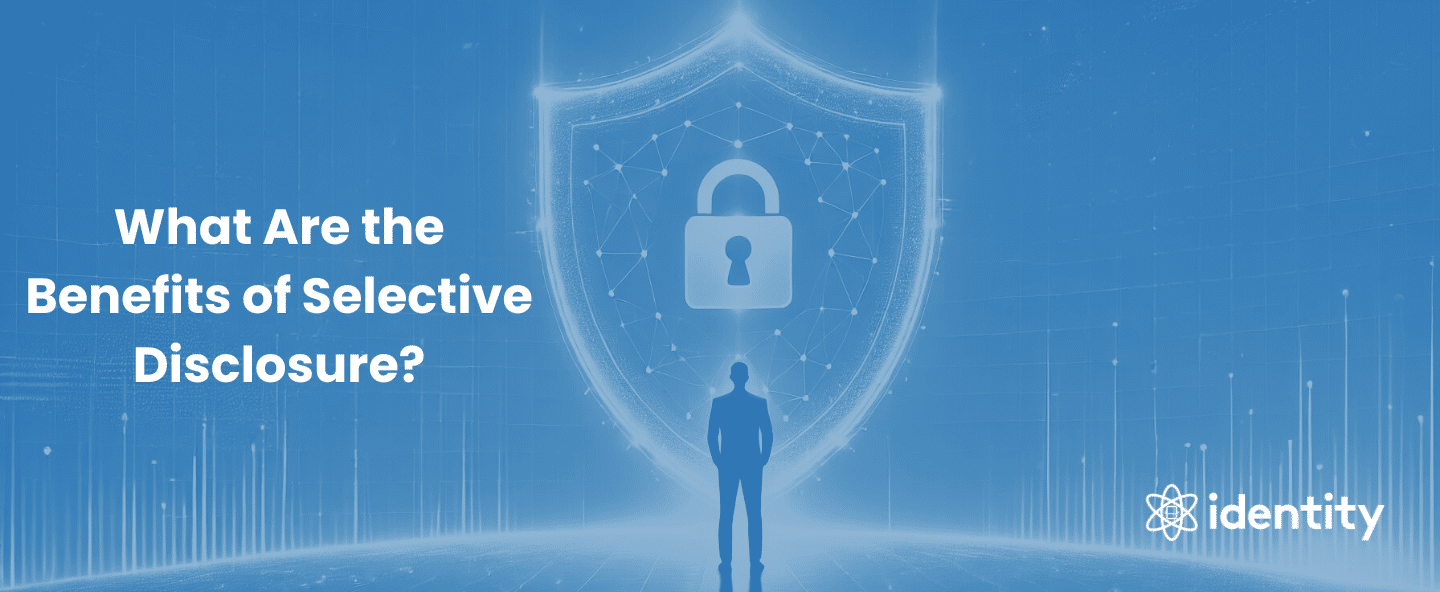Table of Contents
Selective disclosure is transforming the way we share information by allowing individuals to provide only the specific details required for a transaction, rather than exposing all their personal data. The main benefit of this approach is that it enhances privacy while giving users greater control over their personal information. With growing concerns about data privacy, selective disclosure has become essential for both individuals and organizations. It not only protects sensitive data but also fosters trust, ensures compliance, and improves operational efficiency.
Here are the six key benefits of selective disclosure:
- User-Centric Control
- Increased Trust and Transparency
- Compliance with Privacy Regulations
- Enhanced Security
- Flexibility and Interoperability
- Reduced Storage and Data Management Costs
1. User-Centric Control
Selective disclosure empowers users by giving them control over their personal information. Instead of repeatedly sharing sensitive details to access services, users can disclose only the specific data required for a particular purpose. For example, in online banking or e-commerce, users may choose to share only relevant financial information, like payment details, without revealing personal data such as addresses or identification numbers. This targeted data sharing reduces user fatigue and enhances the overall user experience by minimizing unnecessary exposure of personal information.
2. Increase Trust and Transparency
Empowering users to see and control the information they share creates transparency, which in turn develops trust between individuals and organizations. Users feel more secure knowing exactly what data is being shared and for what purpose. For instance, someone applying for a loan can provide proof of income without exposing excessive financial details, increasing confidence that their information is being handled responsibly.
With 85% of customers saying that they will not do business with a company if they are worried about its data practices, businesses need to be proactive when it comes to security. Companies that implement selective disclosure benefit from this increased trust, as users are more likely to engage with services when their data privacy is respected. This leads to stronger, more transparent relationships between users and businesses, ultimately fostering long-term customer loyalty.
3. Compliance with Privacy Regulations
Adopting a selective approach to data sharing also helps businesses comply with global privacy laws, such as GDPR in Europe and CPRA in the United States. By collecting only the minimal necessary personal data, organizations align with regulations focused on data minimization and transparency. As these laws evolve, companies using this method are better equipped to adapt without major disruptions, ensuring they meet new privacy standards efficiently while reducing risks associated with data over-collection.
4. Enhanced Security
Limiting the amount of personal data shared reduces the risk of identity theft and fraud. For example, services like Apple Pay and Google Pay use tokenization, a process that replaces sensitive information—such as credit card numbers—with virtual tokens. These tokens serve as a stand-in for the real data during transactions. This ensures that even if the transaction is intercepted, the actual details remain protected.
By sharing only the necessary information, businesses also minimize their exposure to data breaches. According to IBM, the average cost of a data breach in 2023 was $4.45 million, with 82% of breaches involving personal data. This staggering statistic underscores the importance of selective disclosure in reducing the likelihood of sensitive information being compromised. By adopting this approach, companies not only enhance their security measures but also gain a strong defense against cyber threats.
5. Flexibility and Interoperability
A key advantage of selective disclosure is its ability to facilitate interactions across multiple platforms and systems without compromising privacy. This interoperability enables users to move between different services while maintaining control of their personal information. For instance, in decentralized identity systems like Self-Sovereign Identity (SSI), individuals can manage and selectively share their credentials across various environments, ensuring that their data remains secure and under their control, no matter the platform.
6. Reduced Storage and Data Management Costs
Selective disclosure can help organizations significantly reduce storage and data management costs, especially those handling large volumes of personal information. By focusing on collecting only the essential data needed for specific purposes, companies can minimize their data footprint, streamline management processes, and enhance overall security. This approach is particularly beneficial in industries like finance, where institutions typically store vast amounts of customer data. For example, by verifying loan eligibility using only relevant credentials, banks can reduce the volume of stored data, lowering costs and boosting security. This practice aligns with data minimization principles, ensuring compliance with privacy regulations while maintaining operational efficiency.
How Identity.com Is Developing User-Centric Solutions
Identity.com is a forward-thinking organization focused on creating identity verification solutions that put users in control of their personal data. As a member of the World Wide Web Consortium (W3C), Identity.com is committed to building a future where individuals maintain full ownership and privacy over their digital identities. Our open-source ecosystem enables seamless, decentralized on-chain identity verification, enhancing security and streamlining digital interactions.
We offer a range of developer tools designed for secure authentication and verification on the blockchain. Additionally, we are currently developing the Identity.com app, a secure and convenient solution for managing digital IDs using verifiable credentials. A key feature of the app is selective disclosure, which allows users to share only the specific information required for a transaction, such as verifying age, without revealing unnecessary details like full identification or addresses. Users retain complete control over their data, with the option to revoke access at any time.
This app aligns with Identity.com’s broader vision of providing flexible, interoperable identity solutions that prioritize privacy, support decentralized identity systems, and comply with global privacy regulations. Stay tuned for the official announcement of our app on Android and iOS, marking a new era of secure, user-centric identity management.






